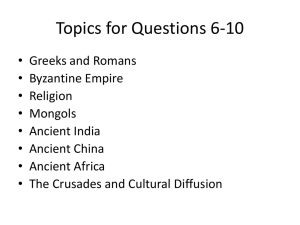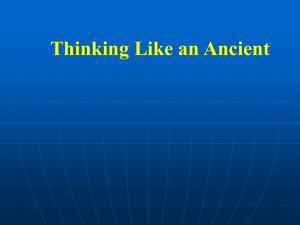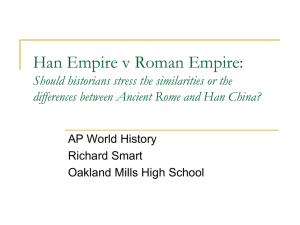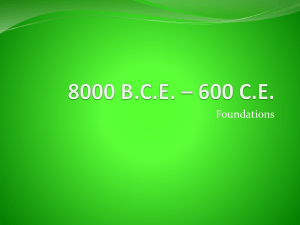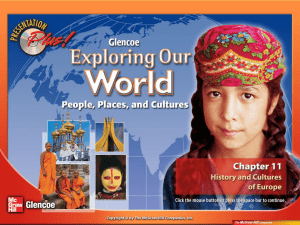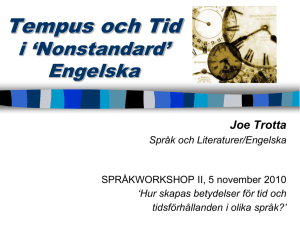ANTIKENS EKONOMI litt.lista - Ekonomisk
advertisement
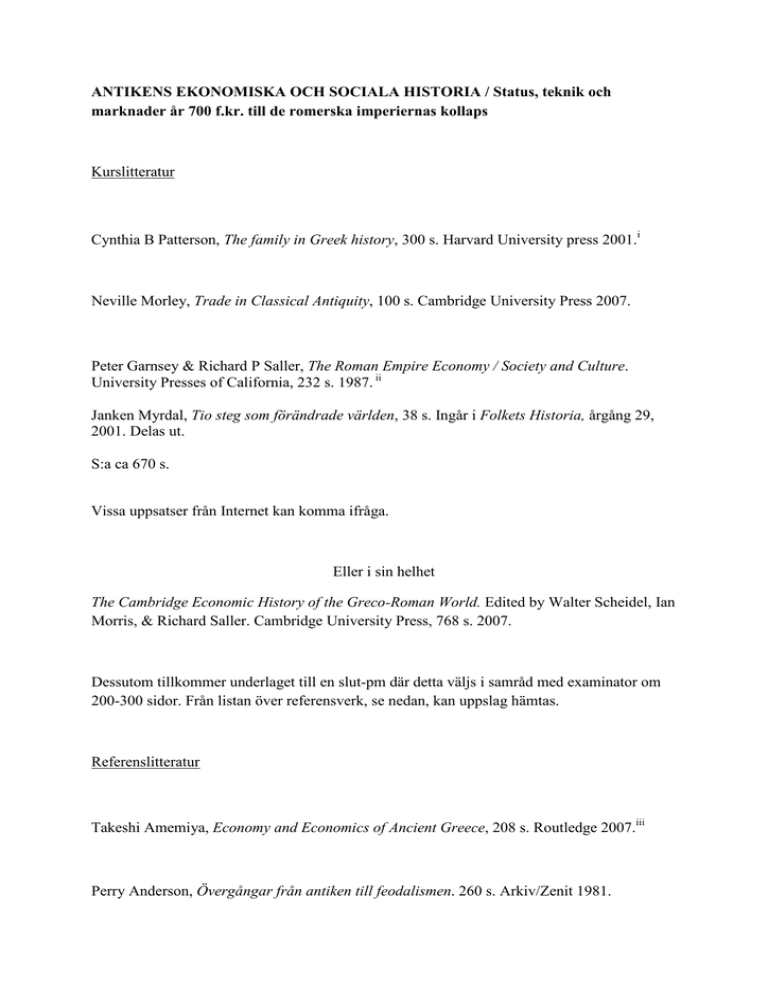
ANTIKENS EKONOMISKA OCH SOCIALA HISTORIA / Status, teknik och marknader år 700 f.kr. till de romerska imperiernas kollaps Kurslitteratur Cynthia B Patterson, The family in Greek history, 300 s. Harvard University press 2001.i Neville Morley, Trade in Classical Antiquity, 100 s. Cambridge University Press 2007. Peter Garnsey & Richard P Saller, The Roman Empire Economy / Society and Culture. University Presses of California, 232 s. 1987. ii Janken Myrdal, Tio steg som förändrade världen, 38 s. Ingår i Folkets Historia, årgång 29, 2001. Delas ut. S:a ca 670 s. Vissa uppsatser från Internet kan komma ifråga. Eller i sin helhet The Cambridge Economic History of the Greco-Roman World. Edited by Walter Scheidel, Ian Morris, & Richard Saller. Cambridge University Press, 768 s. 2007. Dessutom tillkommer underlaget till en slut-pm där detta väljs i samråd med examinator om 200-300 sidor. Från listan över referensverk, se nedan, kan uppslag hämtas. Referenslitteratur Takeshi Amemiya, Economy and Economics of Ancient Greece, 208 s. Routledge 2007.iii Perry Anderson, Övergångar från antiken till feodalismen. 260 s. Arkiv/Zenit 1981. Bertil Andersson, Antik ekonomi / Tematiska studier av den antika ekonomins karaktär och utvecklingsmöjligheter. Paul Åströms förlag, ca 330 s. 1991. Bertil Andersson & Ingemar Nygren, Ekonomisk-historiska teman till antikens ekonomi, ca 130 s. Wahlström & Widstrand 1974. The Ancient Economy. Edited by J. G. Manning and Ian Morris. 240 s. 2005. The Ancient Economy. Edited by Walter Scheidel & Sitta von Reden. Edinburgh University Press, ca 300 s. 2002. The Barbarians of Ancient Europé / Realities and Interactions. Edited by Larissa Bonfante. Cambridge University press, 424 s. 2011. Glen W Bowerstock, Det romerska Arabien. Alhambra förlag, 200 s. 2009. Keith Bradley, Slavery and Society at Rome (Key themes in ancient history). Cambridge University Press, 202 s. Cambridge 1994. Jérôme Carcopino, Dagligt liv i antikens Rom. 260 s. Prisma 1984. Columella, Tolv böcker om lantbruk / En tvåtusenårig romersk lantbrukslära / Samt Liv, lantbruk och livsmedel i Columellas värld. [Tolv artiklar av nutida svenska forskare]. Kungl. Skogs- och Lantbruksakademien. 2009. David Creese, The Monochord in Ancient Greek Harmonic Science. Cambridge University press, 426 s. 2011. Henri Daniel-Rops, Dagligt liv i Palestina på Jesu tid. 225 s. Prisma 1985. Death and Disease in the Ancient City. Ed. Valerie M. Hope & Eireann Marshall. Routledge, 208 s. 2000. Suzanne Dixon, The Roman Family, 180 s. Johns Hopkins University Press, 1992. A G Drachman, Antikens teknik. 120 s. Prisma 1965. Benjamin Farrington, Grekisk vetenskap / Från Thales till Ptolemaios. 260 s. Prisma 1965. Richard Duncan-Jones, Structure and Scale in the Roman Economy, Cambridge University Press, ca 200 s, 2002. Moses I Finley, The Ancient Economy. 200 s. Flera upplagor. Moses I Finley, Ancient History / Evidence and Models. 100 s. Flera upplagor. Moses I Finley, Aspects of Antiquity / Discoveries and Controversies. 190 s. Flera upplagor. Moses I Finley, The World of Odysseus. 170 s. flera upplagor. Hans Furuhagen, Pompeji bakom ruinerna. 170 s. Natur och kultur 2004. Peter Garnsey, Food and Society in Classical Antiquity. Cambridge University Press, ca 150 s. 1999. Charles Gates, Ancient cities / The Archaeology of Urban Life in the Ancient Near East and Egypt, Greece, and Rome. Routledge, London & New York 2003, s. 1-275. Ingemark Gerding Castoriano, Liv och död i antikens Rom. 200 s. Historiska media 2000. Kevin Greene, The Archaeology of Roman Economy. University of California Press, 192 s. Berkeley 1990. Kyle Harper, Slavery in the Late Roman Mediterranean, AD 275-425 / An Economic, Social and Institutional Study. 620 s. Cambridge University Press 2011. Christer Hedin, Mellanöstern under antiken / Kulturernas mötesplats. 268 s. Dialogus 2008. A H M Jones, The Decline of the Ancient World. 370 s. Longman 1966 eller senare upplaga. Constantina Katsari, The Roman Monetary System / The Eastern Provinces from the First to the Third Century AD. 420 s. Cambridge University Press 2011. Christian Laes, Children in the Roman Empire / Outsiders Within. Cambridge University press, 380 s. 2011. Angeliki E. Laiou & Cécile Morrisson, The Byzantine Economy. Cambridge University press, 250 s. 2007. Ray Laurence, Roman Pompeii / Space and Society. Taylor & Francis, London rev. ed, 240 s. 2006. Michael McCormick, Origins of the European Economy / Communications and Commerce AD 300-900. 800 s. Cambridge University Press, 2001. Leopold Migeotte Economy of The Greek Cities From the Archaic Period to the Early Roman Empire, 210 s. University Presses of California. 2009. Carlos F. Noreña, Imperial Ideas in the Roman West / Representation, Circulation, Power. Cambridge University press, 440 s. 2011. Sarah B Pomeroy, Goddesses, Whores, Wives and Slaves / Women in Classical Antiquity. Schocken Books, 267 s. 1998. Sitta von Reden, Money in Classical Antiquity. 264 s. Cambridge University Press 2011. William Rosen, Justinian’s Flea / Plague, Empire & the Birth of Europe. 320 s. Pimlico 2008. Charles Seltman, Women in Antiquity. 160 s. Collier Books, N Y, 1962. Giusto Trahina, 428 AD / An Ordinary Year at the End of the Roman Empire. Översatt av Allan Cameron. 130 s. Princeton 2009. Frank William Walbank, Det västromerska rikets fall / Ekonomiska, politiska och sociala orsaker. 170 s. W&W 1969. Women in the Ancient Near East / A Sourcebook. Edited by Mark Chavalas, 272 s. Routledge. Eva Queckfeldt, Medelhavsvärlden / 3000 år av historia. Studentlitteratur 2001. ------------------------------------------------------------------------------------------------------------Daniel C. Gedacht, Economy and Industry in Ancient Rome (Primary Sources of Ancient Civilization: Rome). BARNBOK på 24 s!! Paul Louis, Ancient Rome at Work / An Economic History of Rome From the Origins to the Empire. Price: £115.00. Routledge 2005. 384 s. Först publicerad 1927. Order, legitimacy, and wealth in ancient states / edited by Janet Richards and Mary Van Buren. 2000. Få artiklar om antiken, mkt om Maya, Kina etc. i The family, Cynthia Patterson demonstrates, played a key role in the political changes that mark the history of ancient Greece. From the archaic society portrayed in Homer and Hesiod to the Hellenistic age, the private world of the family and household was integral with, and essential to the civic realm. Early Greek society was rooted not in clans but in individual households, and a man's or woman's place in the larger community was determined by relationships within those households. The development of the city-state did not result in loss of the family's power and authority. Patterson argues, rather, the protection of household relationships was an important element of early public law. The interaction of civic and family concerns in classical Athens is articulated by the examples of marriage and adultery laws. In law courts and in theatre performances, violation of marital relationships was presented as a public danger, the adulterer as a sexual thief. This is an understanding that fits the Athenian concept of the city as the highest form of family. The suppression of the cities with the ascendency of Alexander's empire led to a new resolution of the relationships between public and private authority: the concept of a community of households, which is clearly exemplified in Menander's plays. Undercutting hitherto common interpretations of Greek experience as evolving from clan to patriarchal state, Patterson's analysis sheds light on the role of men and women in Greek culture. ii During the first, stable period of the Principate (roughly from 27 BC to AD 235), when the empire reached its maximum extent, Roman society and culture were radically transformed. But how was the vast territory of the empire controlled? Did the demands of central government stimulate economic growth, or endanger survival? What forces of cohesion operated to balance the social and economic inequalities and high mortality rates? Why did Roman governments freeze the official religion while allowing the diffusion of alien, especially oriental, cults? Are we to see in their attitude to Christianity a policy of toleration - or simply confusion and a failure of nerve? These are some of the many questions posed in this book, which offers the first overall account of the society, economy and culture of the Roman empire. Addressed to non-specialist readers no less than to scholars, it breaks with the traditional historian's preoccupation with narrative and politics. As an integrated study of the life and outlook of the ordinary inhabitants of the Roman world, it deepens our understanding of the underlying factors in this important formative period of world history. iii Addressing the dearth of literature that has been written on the aspect of economic history, this work analyzes the two diametrically opposed views about the exact nature of the ancient Greek economy. It explores various areas of the Athenian economy, including public finance, banking, and manufacturing and trade. KOSTAR ÖVER 1000-LAPPEN …

